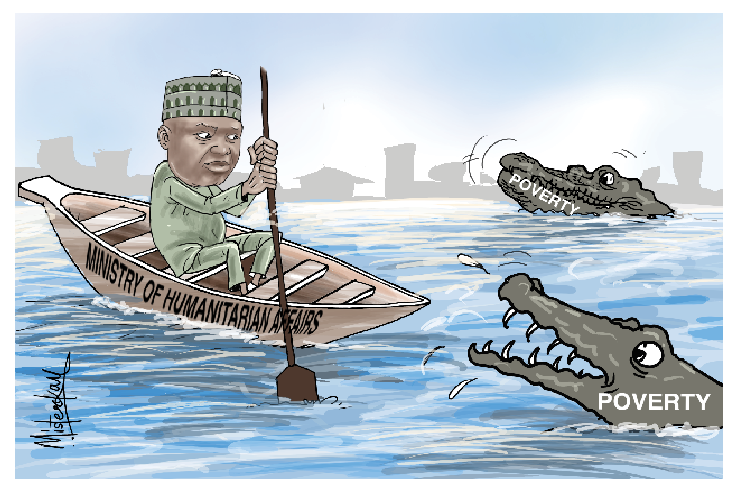The anticipation among Nigerians was palpable when rumours emerged about an impending cabinet reshuffle. Many hoped that underperforming ministers –and quite a handful of them exist in the cabinet—would be asked to go home.
However, the president surprised the public by removing only five ministers and appointing seven new ones, a move that left citizens wondering if performance was the yardstick used in sacking and retaining some ministers.
Public sentiment suggests, and perhaps rightly so, that political consideration and not performance led to the reshuffle. Had performance been the deciding factor, many existing ministers would have found themselves out of office. It seems that politics trumps performance for the president and his advisers.
With the reshuffle done, the newly appointed ministers must now collaborate with their existing colleagues to implement the administration’s “Renewed Hope Agenda.” Among these new cabinet members, Prof. Yilwatda Nentawe, the Minister of Humanitarian Affairs, faces arguably the toughest challenges.
Nentawe steps into office at a time when poverty levels are alarming: over 82.9 million Nigerians live in poverty. According to the National Bureau of Statistics, 40 per cent of Nigeria’s population suffers from extreme poverty, while 63 per cent are classified as multidimensionally poor, meaning they experience multiple severe deprivations. Expectedly, vulnerable groups—including widows, orphans, people with disabilities, and migrants—are the worst hit as they face the brunt of this hardship.
Focus On Humanitarian Ministry
Given the scale of hardship, all eyes are on the Ministry of Humanitarian Affairs and Poverty Reduction. Where else should attention be directed when an astonishing 133 million people live in multidimensional poverty? The focus on this ministry is justified, as rising poverty is making millions of Nigerians hopeless under a government that promised renewed hope.
Ironically, as poverty soars, the Ministry of Humanitarian Affairs has often found itself entangled in corruption allegations, compromising its mission. Sadiya Umar Farouk, the ministry’s pioneer minister, faces prosecution over alleged graft, and her successor, Betta Edu, was suspended for allegedly diverting N585 million public funds meant for disbursement to vulnerable persons into private accounts. Before the much-anticipated cabinet reshuffle, many wondered whether Betta Edu, the suspended minister, would be replaced or reinstated.
Betta’s suspension, eventual sack, and the fact that her predecessor, Sadiya Umar Farouk, is facing prosecution over alleged graft, are both telling signs of the challenges Nentawe must be prepared to confront. Former Minister Farouk has been ordered by a court to account for N729 billion earmarked for poverty alleviation. Halima Shehu, CEO of the National Social Investment Programme Agency (NSIPA)—one of the ministry’s agencies—was also suspended on corruption charges. These examples underscore the ministry’s apparent legacy of corruption.
Now, Nentawe inherits the daunting challenge of tackling poverty and the unenviable task of restoring public trust in a ministry that many believe serves only to enrich a select few. What a responsibility!
The Tasks Ahead
Nentawe’s responsibilities are immense, especially as he takes charge at a time when Nigeria’s vulnerable population is at an all-time high. The administration’s recent policies have only worsened poverty, meaning the Humanitarian Affairs Ministry has more work than ever.
As he assumes office, Nentawe must remember that he is leading one of the nation’s most crucial ministries. This ministry’s role is to shape policies addressing humanitarian needs, coordinate national and international humanitarian efforts, and create programs that protect marginalized citizens. Additionally, it is mandated to prevent human trafficking, protect migrants, support vulnerable groups, and partner with other organizations to combat poverty.
Notably, Nentawe is the first academic to helm this ministry. His academic background can guide him in making evidence-based decisions. Still, he must resist any temptation to use his position for political patronage, serving only APC members or his supporters from Plateau State.
To address poverty meaningfully, the Ministry of Humanitarian Affairs must collaborate with public and private organisations to boost human capital development. Cash disbursements alone, as seen under the previous administration and Minister Betta Edu, have proven ineffective and susceptible to misuse.
If executed well, cash disbursement can raise incomes, reduce poverty, empower beneficiaries, and establish safety nets. Yet, systemic corruption has undermined this potential in Nigeria. Nentawe’s ministry must think differently, rejecting cash transfers as a sole solution and focusing on sustainable programmes.
We cannot forget that President Bola Ahmed Tinubu has yet to make significant strides in tackling Nigeria’s entrenched poverty. His administration’s policies have further aggravated citizens’ hardship. Seventeen months into his tenure, poverty has only deepened, and the economy shows worrying signs, dampening hopes of improved living standards for the people. The citizens have been repeatedly asked to exercise patience, and nothing suggests we will be out of the woods soon.
Nentawe’s ministry is now responsible for changing this narrative, and it must start with a fresh, transparent approach to humanitarian and poverty-reduction efforts. Time is running out.
Nasarawa’s Menstrual Hygiene Bill
Recently, the Nasarawa State House of Assembly held a public hearing on a bill for a Law to mandate the state government to provide free menstrual hygiene products for girls in public schools. The bill sponsored by the only female member of the House of Assembly, Hajara Danyaro, when passed and assented by the governor, will address the issue of stigmatisation of female students during menstruation.
It will, importantly, ensure the availability of menstrual hygiene products in public schools across the state and avoid the distraction of female students during menstruation. This is, no doubt, a phenomenal move in the overall drive towards enhancing girl child education in the state. The United Nations Children’s Fund (UNICEF) said Nigeria accounts for 15 per cent of the global out-of-school children population, with about 7.6 million girls out of school. These appalling statistics comprise 3.9 million in primary school and 3.7 million in junior secondary school. Kudos to Danyaro, the first female to be elected state assembly member in the state’s history.





